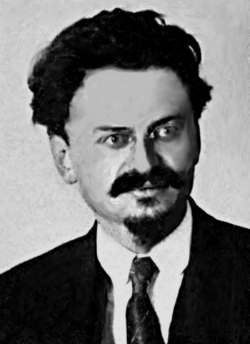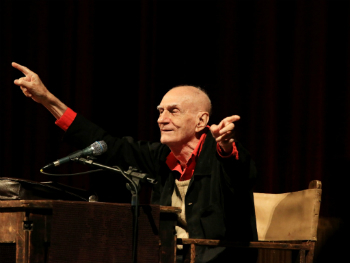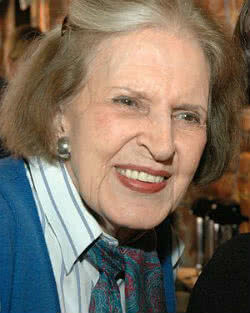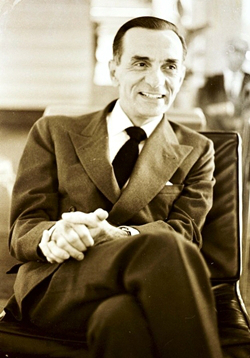Leon Trotsky he was a Marxist intellectual, communist revolutionary, and Ukrainian political activist who led the Bolsheviks in the Russian Revolution (1917).
Biography

Trotsky was a Bolshevik leader in the Russian Revolution
Lev Davidovich Bronstein, better known as Leon Trotsky, was born in Ianovka, Ukraine, on November 7, 1879.
His family was of Jewish origin and from his youth took part in revolutionary movements. He participated in the founding of the “Southern Russian Workers' Union”, and was arrested by the tsarist regime for the first time in 1898, at the age of just 18 years.
Trotsky was sentenced to deportation to Siberia, from where he escapes and goes to London to meet with Lenin, joining the “Russian Social Democratic Party”. A few years later he goes to Vienna, Austria, where he created the newspaper Pravda.
In 1903, with the division of the Russian Social Democrats between Mensheviks and Bolsheviks, Trotsky took a stand against the Bolsheviks. Later, he would revise this decision, thus adhering to the causes of the Bolsheviks (the majority led by Lenin).
Although there were several disagreements between Trotsky and Lenin, in October 1917 when the Revolution took place, he joined Lenin. Trotsky would play a leading role in the implantation of socialism and the Bolshevik regime in Russia.
After Lenin's death and the rise of Stalin, Trotsky found himself in a dangerous position. While advocating that the revolution should spread throughout the world and that Russia should help them, Stalin preferred that communism stay within the borders of his country.
In this way, Stalin sends him into exile and for some years he came to live in several countries in Europe such as England, France, Austria, Turkey, Norway.
He also goes to the United States and Mexico. In this country, he even lives with Mexican artists Diego Rivera (1886-1957) and Frida Kahlo (1907-1954).
Trotsky was a charismatic, intellectual and revolutionary person, who participated in important historical events of his country and who symbolized a great threat to Stalin's government.
For this reason, Stalin sends an agent to kill Trotsky, who at that time was exiled in Mexico.
Thus, on August 21, 1940, he was brutally murdered with a blow to the head with a pickaxe, in Coyoacán (Mexico), by the Spaniard Jaime Ramón Mercader.
He worked as an agent of the political police of the USSR called “People's Commissariat for Internal Affairs” (NKVD, for its acronym in Russian).
Participation in the Russian Revolution
With the fall of Tsarism in Russia, Leon Trotsky returned to his country and together with Lenin implemented the socialism in Russia.
He held several important positions in the politics of his country, being People's Commissar (Minister) for Foreign Affairs, Commissar of War, Organizer and Commander of the Red Army.
In addition, he was founder and member of the Executive Committee (Politburo, in Russian) of the Communist Party of the Soviet Union.
Read more about Russian revolution.
As important as Trotsky's political role were his intellectual contributions.
Over the years, a strand of Marxist doctrine, called “Trotskyism” was created. This is based on the activist's political and ideological ideas and opposes the “Stalinism”.
Construction
Despite having been a politician, Leon was an intellectual who contributed his thinking leaving several writings:
- Balances and Perspectives (1905)
- War and the International (1914)
- The Right of Nations to Self-Determination (1917)
- Terrorism and Communism (1920)
- Literature and Revolution (1924)
- The Lessons of October (1924)
- Stalin's Triumph (1929)
- History of the Russian Revolution (1930)
- The Permanent Revolution (1930)
- History of the Russian Revolution (1933)
- Writings on Germany (1933)
- The Revolution Betrayed (1936)
- The USSR in War (1939)
Sentences
- “The property of the State is not that of 'all people', but that as social privileges and distinctions disappear and as a consequence, the State loses its raison d'être. In other words: State property becomes socialist as it ceases to be State property.”
- “In a country where the only employer is the state, opposition means slow death from starvation. The old principle 'those who don't work, don't eat' was replaced by another: those who don't obey don't eat”.
- “It will come, the revolution will win everyone the right not only to bread but also to poetry”.
- “Life is Beautiful. May future generations free it from all evil and oppression, and may they enjoy it in all its fullness”.
- “To expose the truth about the situation to the oppressed is to open the way to revolution for them”.
- “You have to know the limits of strength. You need to know when to combine strength with strategy.”
Curiosities
- It was from 1902 onwards that the revolutionary adopted the pseudonym Leon Trotsky that will carry him throughout his life.
- Trotsky's assassination cost the Stalinist government around five million dollars.
- The Bolshevik motto was “Peace, bread and earth”.
To know more:
- Marxism
- Communism



